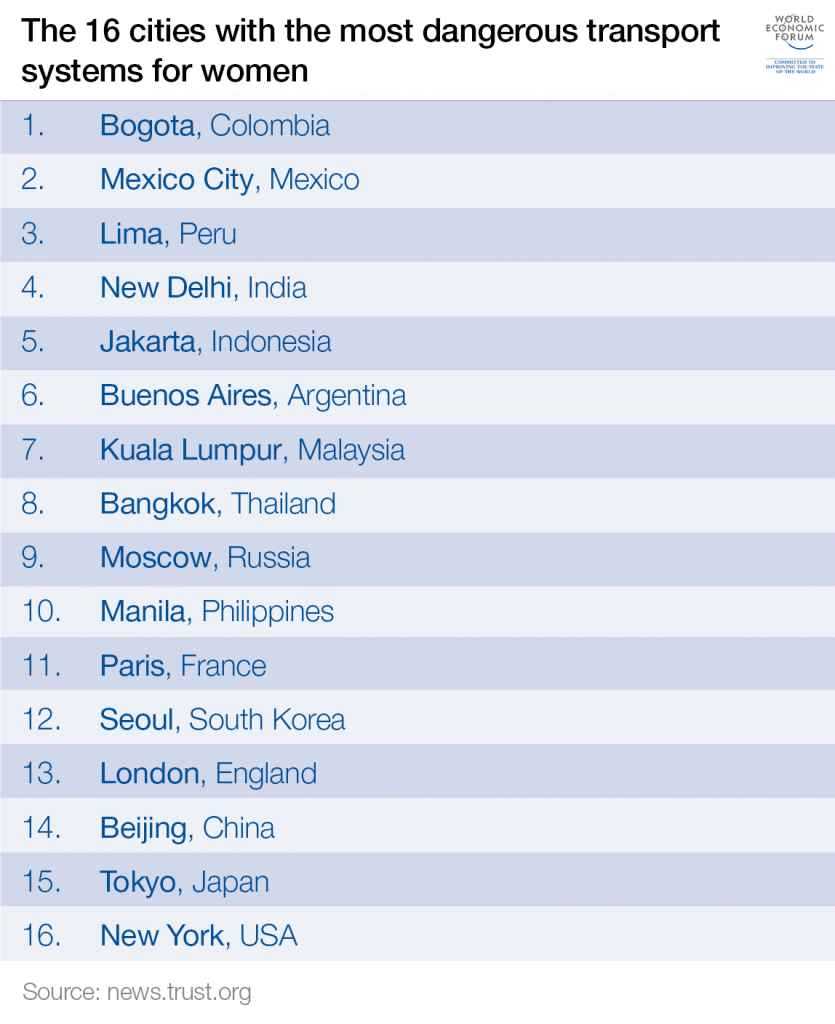Which cities have the most dangerous transport systems for women?
“I knew I was in danger from the way the hair stood up on the back of my neck. I was walking home, well past midnight – I heard him before I saw him.” So writes Dae Levine, a campaigner for Safe Cities for Women, of the night she narrowly avoided being attacked by a stranger in New York.
And yet of all the cities assessed in a Reuters study into the world’s most dangerous transport systems for women, New York is reckoned to be the safest. The city comes last in a poll of 16 cities, with only three out of 10 women reporting having been verbally abused on buses and trains.
Wherever they are, in the first world or developing countries, in crammed commuter trains or walking home from the village well, millions of girls and women face harassment, violence and intimidation on a daily basis.
What with rapid urbanization (since 2011, more people live in cities than in rural areas), cities have become particularly perilous, with city halls struggling to maintain standards of public safety in the face of fast-expanding populations, and support creaking transport infrastructure.
The Thomson Reuters Foundation, in collaboration with polling company YouGov, asked more than 6,550 women in 15 of the world’s 20 largest capital cities, plus New York (the biggest city in the United States), how safe they felt when travelling on public transport. The questions addressed five points:

Bogota and two other Latin American capitals – Mexico City and Lima, Peru – were named as the three cities with the least safe transport systems for women, with more or less 60% of the women surveyed reporting physical harassment while travelling.
Mexico City fared worst, with 64% of the 380 women questioned saying they had been groped or otherwise harassed on public transport. In Lima the figure was 58%. In London, by contrast, the fourth-safest city in the poll, the figure was only 19%.
Mary Crass, head of policy at the OECD’s International Transport Forum, said the results highlighted the need for more action. “When there is not frequent, reliable, accessible transport, this can affect women and anyone’s ability to access opportunity and notably employment in urban areas, which can make a big difference for women in particular,” she told Reuters.
Violence and the threat of abuse restrict women’s and girls’ freedom of movement, says UN Women on its website. “It reduces their ability to participate in school, work and public life. It limits their access to essential services and their enjoyment of cultural and recreational opportunities. It also negatively impacts their health and well-being.”
So what are cities doing about it?
In New York, rated first for safety by the poll, there is a growing network of CCTV security cameras on streets and transport routes, Help Point kiosks and an obvious police presence.
Tokyo, rated second, was one of the first major capitals to introduce women-only trains in 2000, colour-coding designated areas in pink and employing transit police to enforce rules.
Women-only sections are now also found on buses and trains around the world – from Bogota to Jakarta, Cairo to Kuala Lumpur – while other cities, including London, are debating new safety measures, such as introducing a 24-hour harassment hotline and improving lighting. –https://www.weforum.org/agenda/2016/03/which-cities-have-the-most-dangerous-transport-systems-for-women?utm_content=bufferff467&utm_medium=social&utm_source=twitter.com&utm_campaign=buffer